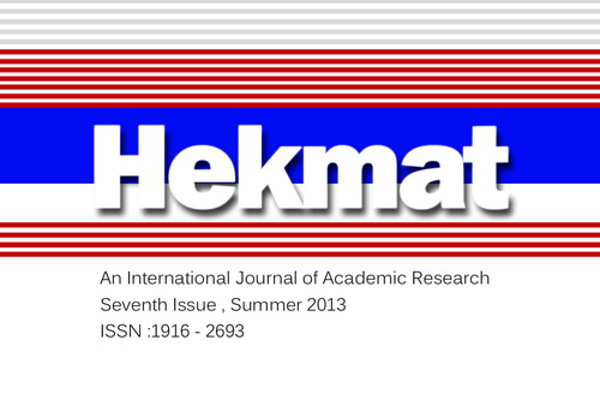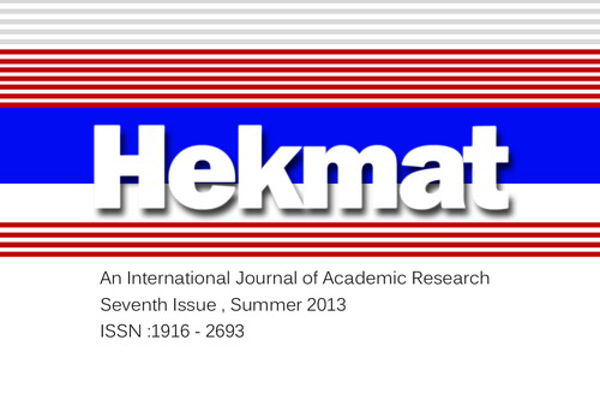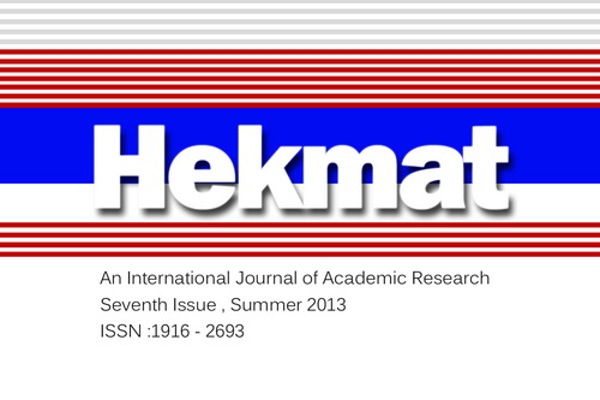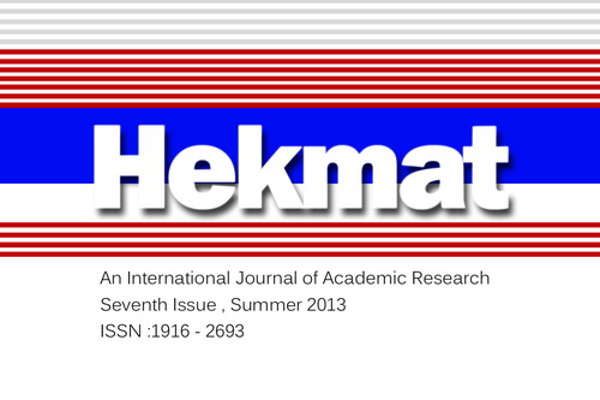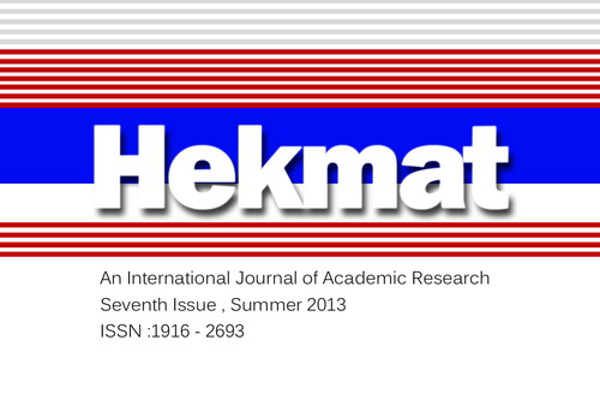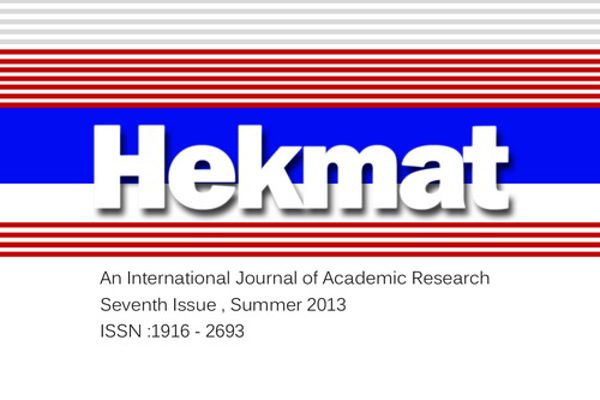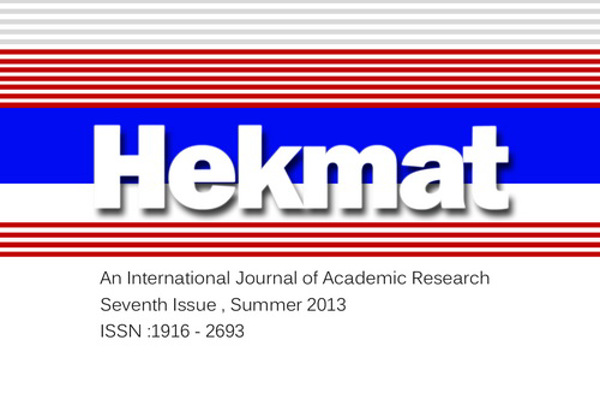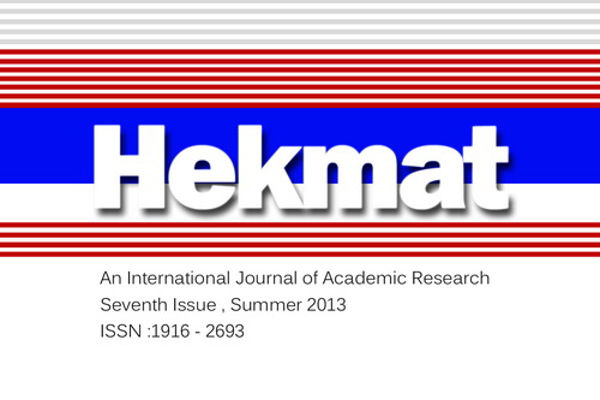The ontological foundations of sexual ethics / By: (Sharafi Mohamad Reza) and (Taherpur Mohamad Sharif)
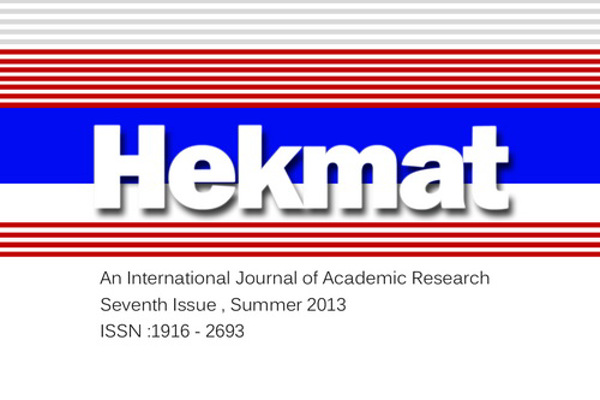
The ontological foundations of sexual ethics
By: Sharafi Mohamad Reza[1]
and Taherpur Mohamad Sharif[2]
Abstract
In the contemporary world, conscious understanding of sexual drive is of paramount importance. Various discourses have so far emerged in this area. If we do not introduce the Islamic discourse about sexual drive as an independent one, we should expect that other discourses influence society and fill the gap. As a result, conflicting value systems we need to the emergence of different kinds of crashes in society, within family, and among the new generation. It is for this reason that Islamic sexual ethics must be introduced and analyzed from different aspects. This paper undertakes to explain the ontological foundations of Islamic sexual ethics in a descriptive-analytic method.
Among the principles of Islamic sexual ethics, we can mention sacredness, respect for boundaries, satisfaction, wisdom, preparation, purity, immunity, purpose, attraction, and congruence.
Keywords: foundations, ontological, sexual ethics, Islam
Introduction
Sexual ethics constitutes a part of ethics that deals with those human behaviors, attitudes, and traits that are relevant to sexual life[3]. It is a very important part of human sciences and a foundational subject in social studies with direct influence upon the progress and development of human society. Only through firm commitment to a rational sexual ethics people can be trained in a way that secures spiritual and psychological health of society and immunity from spiritual complications, problems, and deviations.
Because of the extraordinary power of sexual drive as an instinct in human life, the administration of sexual ethics has always been considered as the most important moral obligation. As Will Durante says, “The most important moral task has always been the task of managing sexual relations because the instinctive drive for propagation in man is capable of causing problems not only in matrimonial life but also before and after marriage. Disorder and chaos in social institutions are caused by a deviation of this instinctive drive from its natural course due to its strength, vigor, and often stubborn refusal to abide by law”.[4]
On the other hand, every moral system governing society stems from a particular philosophical system that justifies why one needs to abide by that moral system. Historically speaking, philosophy has been divided into two sections: theoretical philosophy and practical philosophy. Theoretical philosophy included metaphysics, physics, mathematics, ontology, and epistemology. Practical philosophy included economics, politics, and ethics discussing the relations among people within family, community, society, as well as one's private life. So, practical philosophy discusses values. In the meantime, the two branches of philosophy interact. They are not separated islands. Professor Motahhari says,
“The questions of practical reason cannot be answered in isolation from the questions of theoretical reason. What a philosopher thinks about the world, life, humanity and his view about the teleological aspect of being and life determine the direction of his ethical system. A naturalist philosopher holds foundational views on these issues obviously different from those a theist does. Their moral philosophies differ as the result. Therefore, the moral philosophy of any philosophers cannot be understood except against the background of his views on the nature of being, life, and human. In general, practical philosophy of any school supervenes on its theoretical philosophy”.[5]
Hence, for a sexual moral system to rule over a society successfully, the philosophical basis of that moral system must be understood and endorsed by citizens. People can endorse a system of thoughts only if they are properly informed about it. Thus, education comes first. The fundamental precepts and principles of a moral system should be taught. When citizens come to learn these principles, they can realize why they should abide by the rules of the moral system prevailing in society. Sexual ethics is no exception. Only in this way can society resist the cultural invasion from outside and become immune to brainwashing. One important part of the philosophical foundations of Islamic sexual ethics is the ontological bases of the system. In this paper, we try to introduce these bases.
The historical background
Historically speaking, there are three distinct approaches to the question of sexual ethics; the old approach, the modern approach, and the Islamic one.
The old approach is based on monasticism rooted in some ancient or old creeds, religions, or schools of thought such as Hindu Brahmanism (8-9 centuries BC), the Jeanie creed (sixth century BC), Buddhism (sixth century BC), Chinese Taoism, ancient Persian Manichean creed (240 AD), ancient Greek Cynicism, the Esniah sect of Judaism (second century BC), and similar trends in Christendom. The core idea common among all these examples in regard to the question of sexuality is their rejection of sex as a filthy phenomenon, calling to monasticism and mortification, avoiding matrimony and any other mundane pleasures, and finally treating sexual awareness as a taboo.
The modern approach is based on the absolute freedom of sexual relations. This approach is often called modern sexual ethics. It starts with Renascence in Europe and flourishes in the 20th century. Among the founding fathers of this school, we can mention Karl Marx (1818-1883), Friedrich Engels (1820-1895), Zigmond Freud (1856-1939), and Russell (1872-1970). These thinkers paved the way for freedom of sexual relations in society by ideas they preached about issues related to sexuality.
The Islamic approach to the question of sexuality is a moderate one based on the notion of religious service. We can trace this way of thinking back to the works of philosophers such as Avicenna (370-428 lunar Islamic calendar), Al Ghazali (450-505), Mulla Ahmad Naraqi (1185-1245), and Motahhari (1298-1568). It is worthwhile to mention here that a research on sexual ethics in the manner done in this paper has no precedence.
Definitions
Ethics
In the Arabic language, the term used to mean “ethics” is akhlaq. This word is the plural form of the word khulq. It is defined as following: “A stable psychological state of man because of which certain voluntary acts are done easily since they are appropriate to the demands of that state. It may be a virtue such as honesty or bravery, or a vice like cowardice or greed. If this word is used without a qualifier, usually it refers to a virtue”.[6]
Defining Akhlaq, Naraqi says,
“Khulq means a stable habitude of the soul that facilitates man’s doing voluntary actions easily with no need to contemplation, calculation, and reflection. Malakah is a stable habit or trait that usually lingers long and does not fade away fast. On the contrary, hal is a habit that lingers little and disappears quickly”.[7]
Other authors have elaborated on the concept. From these elaborations, we can conclude that the concept akhlaq refers to the character, habits, and traits of man that form his personality and direct his behavior in everyday life, occupation, political life, family life, personal life and ones relations to the group or class to which one belongs. One author sees akhlaq as the way one compromises with regulations, rights, and obligations; since two rational social standards may, sometimes, clash, one gradually learns how to judge in such cases according to one’s own conscience.[8] Another author understands akhlaq as the flourishing of positive, good, and superior characters of man in the course of progress to ideals of life.[9] In this research, we shall depend on this definition more as it involves supreme ideals of education and training since these ideals direct all dimensions of human life including the sexual.
Sexual ethics
Sexual ethics is a part of general ethics that is concerned with human habits, habitudes, traits, and modes of conduct in relation to natural sexual instinct.[10] Another similar definition for sexual ethics is “rules and norms determining sexual behavior acceptable to a particular society at a particular time rendering any behavior inconsistent as immoral and even abnormal”.[11]
Granting this definition, Islamic sexual ethics is a set of values and norms that determine the boundaries in the relationship between the opposite sexes in social, cultural, political, economic, matrimonial, and generally all formal or informal fields, based on the theoretical and rational foundations of Islamic ontology.
Islam
By “Islam,” we mean the revelation-oriented religion given to Prophet Mohammad by God through the Arch Angel Gabriel consisting of moral, social, political, philosophical, and mystical precepts, and otherwise, reflected in the Holy The Quran.
Tabatabaee, explaining the Arabic term Deen, says, “Deen means Islam which means yielding to the truth and embracing it and doing right”.[12] Makarem explains the word as follows:
The term deen literally means to reward, to obey, and also, it means a set of rules and rituals that can bring man close to God and save man and correct his path according to moral standards. The word “Islam” means to submit. So, the true religion in the eyes of God is submission to His command. The spirit of religion in any epoch is no more than submission to God. Since the religion the last messenger of God has brought for mankind is the last religion God has willed to be men’s, it is named “Islam”. From one point of view, all other religions are also Islam.[13]
Ontological foundations and principles
In this paper, by foundations, we mean those descriptive propositions that reflect Islam’s view of the world. We mean, by principles, the normative propositions directing action and derivable from ontological foundations by method of analysis. So, this principle may not be realized actually unless the ontological propositions are held.
The reason why the term ontology is deployed here is that Islamic philosophy starts with discussing the essence of being. Since this philosophy enjoys a religious tinge and pursues approximation of man to God as the origin of being, it includes discussions on theism, teleological dimension of the world, the two realms of mundane life and the life after death.
Islamic ontological foundations of principles of sexual ethics
In this section, we shall mention the notions which can be driven from the holy Quran as principal Islamic ontological foundations of sexual ethics.
1. God as the ultimate axis
Islamic ontology sees God as the center of being. God is the ultimate metaphysical truth. He rules over the world and controls everything. He is the real agent who administers the universe. God, as the Creator, is also the owner of the World of Being. The heavens and the earth and everything which takes place within them are under His control and management.
Of the notion of God as the Creator, The Quran says, “And the messengers asked them can there be any doubt about God who has created the heavens and the earth…” (The Quran, Sura Ibrahim, verse 10). Since God is the sole creator of everything, He is the sole owner of the heavens and the earth. It is only He who can implement every command He issues about the world. It can be concluded that the very existence of everything entirely depends on God let alone any effect anything is supposed to leave on something. All kingdoms really belong to Him. He gives life and takes it away. He is omnipotent. His power has no limits. The Quran also says, “He is the sovereign over the heavens and the earth; He gives life and He takes life away and He is Almighty” (Sura Hadid, verse 2). God comprehends everything in two senses: everything lies within the scope of His power and everything depends on Him for its very existence, hence his omniscience. The ensuing verse of the Quran emphasizes this point: “He is the first and the last; the Visible and Invisible, and He knows everything”.
The idea that God is the ultimate center of the world of being fellows that God is the source of life as well. As the source of life, God enjoys the kernel of life, i.e., the optimum life that has no boundaries or limits. Since the Almighty God is the only source and origin of all existence and the sole creator of every object and power, there is no other agent in this world except those which are created by Him as agents. So, the causal chain ends in Him. Consequently, He sustains everything from every angle. He is the sole sustainer. He is also the absolute sustainer. It is because of God’s existential permission that some beings in the world can sustain some other things. Therefore, God ever sustains the universe with no feeling of weakness or tiredness. Kingdom thoroughly belongs to Him. No absolute control over the world is exercised but by Him.[14] About this, the Quran says,
“There is no God but Allah, the Eternal Live; slumber does not overtake Him nor does sleep. To Allah belongs whatever is in the heavens and on the Earth. Who dares to intercede with Allah without His permission? Allah knows what happens to the people now and what happens to them in the future and none of them would ever compass anything of Allah’s knowledge except as much as He wills. His throne is extended over the heavens and the earth but preserving both of them does not trouble Him. And Allah is the supreme exalted great,” (Sura Baqara, verse 25).
The idea that God is both the Creator and Ruler of the world is a fundamental ontological notion in Islamic thought. This notion leaves very important consequences. In what follows, we shall mention only some of them.
a) The principle of sacredness
When God is seen as the center, a connection is established between the norms of sexual ethics with the origin of existence. To determine the rules and norms of sexual ethics, one need consult religious precepts on top of other sources such as social and cultural structures, etiquettes, and traditions, as well as human scientific and philosophical achievements. Nonetheless, the outcomes of scientific and philosophical research help improve our understanding of religious precepts, too.
The idea that God is the ultimate center of the world of being, as an ontological basis, affects the body of sexual ethics by applying a divine tinge to it. From a theist point of view, the sexual phenomenon is seen as a phenomenon related to God, religion, and religiosity. All components of sexual life assume a particular fragrance due to their divine connection. This amounts to the norms of sexual ethics being based on divine commands inferred from divine revelation. At the same time, the sexual behavior of a Muslim individual would be direct by religious precepts. For this reason, belief in God is considered as a principal criterion the commitment to which is of supreme importance so far as legitimate sexual relationship in the form of marriage is concerned. About this, the Quran says,
“Do not marry unbelieving women (idolaters), until they believe. A slave woman who believes is better than an unbelieving woman, even though she allures you. Nor marry (your girls) to unbelievers until they believe. A man slave who believes is better than an unbeliever, even though he allures you. Unbelievers do (but) beckon you to the fire. But Allah beckons by His grace to the garden (of bliss) and forgiveness, and makes His signs clear to mankind: that they may celebrate His praise,” (Sura Baqarh, Verse 221).
As mentioned in this verse, belief in God is more important a criterion for selecting one's sexual partner than beauty, wealth, or social and political status. This criterion enables the lower classes of society such as slave men and women to surpass upper-class idolaters because marriage does not solely aim at pleasure. It is rather meant primarily as a means for the continuation of human species, and formation of family where children are raised and society is developed and preserved. In marriage, one's sexual partner is a life partner, constitutes a part of one's personality and a parent and teacher of one's children. Children acquire their personality in family through their interactions with their parents. Therefore, any form of deviation whether in behavior or attitude and beliefs leaves its adverse effect on family. It is for this reason that the Quran prohibits Muslims from raising children in an atmosphere conducive to their deviation from the path of truth.
b) Respect for boundaries
Man is, by nature, destined to live in society. In the meantime, man enjoys free will. The combination of these two facts opens the way for clashes among people in society. It is not possible to imprison all individuals in order to prevent them from abnormal and illegitimate behavior hence conflict. So, there remains one alternative way; to teach human beings to obey a set of rules that administer their conducts so that clashes between people are minimized and their healthy exercise of free will is maximized. This requires establishing borders for exercising one’s free will. People should be trained how to recognize these borders and how to observe these rules and regulations. Religion steps in here to facilitate one's self-control. When an individual believes that limits, rules, and regulations are established by God and it is His will that man should observe them, then, they can voluntarily check their behavior in a manner to comply with divine will. Perhaps, it is for this reason that God repeatedly refers to the limits set by God in the Quran: “… Those are limits set by God. So, do not transgress. Those who transgress would be tyrants,” (Sura Baqara, Verse 299).
Moral health is an important criterion that God introduces for evaluation in the domain of sexuality. This factor is instrumental to the growth of human faculty of understanding and judgment. The Quran says, “Let no man guilty of adultery or fornication marry but a woman similarly guilty, or an unbeliever: nor let any but such a man or an unbeliever marry such a woman: to the believers, such a thing is forbidden (Sura Nur, Verse 3). Evidently, this verse prohibits believers from entering into marriage contract with people who lack moral health, commit adultery, and insist on deviation from the framework which religious law has determined, or fail to repent and cleanse themselves from sins. The wisdom behind this prohibition is that such sexual deviations lead to weakness and collapse of family order which in turn results in various psychological, spiritual, and bodily problems as well as the growth of a number of abnormal children with tendencies to sinning and illegal income. Besides moral health, other criteria such as faithfulness and modesty have been mentioned in the Quran: “It may be, if he divorces you (all), that Allah will give him, in exchange, consorts better than you- who submit (their wills), who believe, who are devout, who turn to Allah in repentance, who worship (in humility), who travel (for faith) and fast- whether previously married or virgins,” ( Sura Tahrim, Verse 5).
c) Pleasure
Islamic sexual ethics emphasizes on showing tolerance, care, affection, and love to one's partner in life. Partners ought to try to please and satisfy their partners of life. But this obligation does not mean that seeking the satisfaction of one's partner is more important than seeking the satisfaction of God. According to Islamic precepts, divine satisfaction is of such importance that believers ought to sacrifice everything in order to achieve that. Neither one's own pleasure nor one’s partner’s satisfaction or any other gain whether mundane or heavenly can be preferable in lieu of divine satisfaction. The Quran says, “But the greatest bliss is the good pleasure of Allah; that is the supreme felicity (Sura Tawbah, Verse 72).
Therefore, while it is possible to meet the demands and wishes of one's partner along with divine satisfaction, it is reasonable or preferable to do so. But in cases where there is a conflict between divine wish and one's partner’s, then religiosity requires that one prefers divine satisfaction. On this, the Quran, addressing God’s prophet, says, “O Prophet! Why bannest thou that which Allah hath made lawful for thee, seeking to please thy wives? And Allah is forgiving, merciful,” (Sura Tahrim, Verse 1).
2. The best possible order
The second ontological principle in Islamic thinking is the notion of the best possible order. According to this principle, it is thought that whatever exists in the world is intrinsically beautiful, appropriate, and consistent with the integrity of creation. Ugliness and badness are extrinsic or rather secondary. The concept good refers to things that produce happiness. We can think of three types of goodness: intellectual goodness, sensible goodness, and sensual goodness. Intellectual goodness is said of the property good when reason understands it. If the senses capture goodness in something, we say that goodness is sensible. When we ascribe the property good to something on account of our desires of the flesh rather than our intellect or senses, then, we name that goodness sensual.
What is the essence of goodness? Definition of good is controversial. Some authors have defined it in terms of coherence of the parts constituting an object. When component parts of something do not fit, we say it is not good. A definition proposed by Allamah Tabatabaii says when something fits the purpose for which it is made, we say of it that it is good.[15]
Based on these definitions, we can say that the whole creation is good in the sense that it is a coherent whole, its parts fit one another, and its goodness can be perceived by senses and realized by reason. Also, it fits the purpose for which it is created. The Quran says, “Who made good everything that He has created,” (Surah Sajdah, Verse 7). Elsewhere, it says, “Who created the seven heavens one above another; you see no incongruity in the creation of the beneficent Allah; then, look again, can you see any disorder?” (Surah Molk, Verse 3).
In their interpretation of the Quran, authors have concentrated on two words in this verse: incongruity (تفاوت) and disorder (فطور). Makarem says about the latter term, “The word fotur comes from the stem fatr like satr meaning to break. It is in this sense that eftar means breakfast. But the word also means corruption and disorder. In the verse mentioned above, the second meaning is meant. Hence, the verse says that the more one reflects on the world of creation, the less may he probably find any fault with it”.[16] Tabatabaii explains the difference between these two terms in the following manner:
“The word tafawot comes from the root fowt meaning difference between two objects in features: object X possesses property A but object Y lacks it. But the word fotur used at the end of the verse means disorder. The verse is trying to say nothing in the world of creation happens to be inconsistent with the requirements of wisdom. Devine management is seen in the whole universe as a chain the links of which represent beings in the world. There is a general interconnection between all objects. The Almighty God has created the world in such a way that every particular object can play the role for which it is made without preventing other objects from playing their roles or processing the properties they require for doing their job while all of them are interconnected and interwoven”.[17]
There remains one question to be answered here. What is the secret in the creation being the best possible order? The reason is that the origin of the world is not only good but also pure goodness and sheer beauty. The holy essence of God is pure existence, absolute perfection, and identical with all the attributes of the glory and majesty. This is why in Islamic thought, universe enjoys congruency, consistency, order, and beauty captured by senses and reason.
The impact of the notion of best possible order on ethics
The idea that the world is the best possible order leaves important impacts on principles of sexual ethics. Here, we shall mention some of them.
a) The principle of wisdom
Believing that the world of creation is the best possible order amounts to thinking that when God created man, He equipped him with whatever he may need in his life taking into account all potentialities and requirements. About this, the Quran says, “And He giveth you of all that ye ask for. But if ye count the favours of Allah, never will ye be able to number them. Verily, man is given up to injustice and ingratitude,” (Sura Ibrahim, Verse 34). This verse tells us that God has not overlooked any needs or requirements we have. God has given us whatsoever our existence needs for flourishing even though we may not have verbally asked Him. Divine absolute wisdom makes Him gift us all we need since His purpose of creation would not be realized otherwise.
In response to human natural and instinctive needs and wishes and in accordance with the requisites of his mundane and spiritual life, God has endowed him with feelings, emotions, and drives that partly play the role of channels of connection with the world and partly are forces enabling him to exercise his will. Without these forces, man is unable to tread the path of perfection. So, God has shown utmost wisdom in the process of creation of man.
b) The principle of preparation
Intrinsic wishes and drives man is equipped with including sexual drive, social, economical, and godly desires are primarily created in a manner that no conflict among them may naturally emerge. This means that none of these internal forces naturally deviates from the course God has set. They rather jointly prepare the ground for appropriate human development in all respects. This is so far as the creation is concerned. As to divine Sharia, divine wisdom requires that man being given a relative freedom of choice is led to the correct path by a set of rules so that he chooses his way in life. “If it had been our will, we should have elevated him with our signs; but he inclined to the earth, and followed his own vain desires. His similitude is that of a dog: if you attack him, he lolls out his tongue, or if you leave him alone, he (still) lolls out his tongue. That is the similitude of those who reject our signs; so relate the story; perchance they may reflect,” (Sura al Aaraf, Verse 176). Elsewhere, the Quran says, “We showed him the way: whether he be grateful or ungrateful (rests on his will),” (Sura Ensan, Verse 3).
Because of human freedom of choice, an individual may utilize his God-given faculties in a way contrary to the best possible order of the world and in an opposite direction of divine Sharia. In that case, some existential aspect of his personality may be exaggerated and some maybe undermined. For example, indulgence in the pleasures of the flesh may go to such extreme where other aspects of one's human individuality are suppressed or disdained. Breach of equilibrium in human life may be the result of man's options.
The Quran warns against the likelihood of undesirable exercise of free will whereby the best possible order and the divine law are breached when indulging in sexual pleasure, saying, “Fair in the eyes of men is the love of things they covet: women and sons; heaped-up hoards of gold and silver; horses branded (for blood and excellence); and (wealth of) cattle and well-tilled land. Such are the possessions of this world's life; but in nearness to Allah is the best of the goals (to return to),” (Sura Al Emran, Verse 14). Also, “Wealth and sons are allurements of the life of this world: but the things that endure, good deeds, are best in the sight of thy Lord, as rewards, and best as (the foundation for) hopes,” (Sura Kahf, Verse 46). Explaining this verse, Mottahhari writes:
“This verse does not speak about the natural inclination of man to some pleasures. Rather, it speaks about the exaggerated attachment to sensual desires as a result of some external elements making man overestimate the desires giving them priority as the highest ideals that distract human attention from other aspects of life. Therefore, religion does not aim to resist natural and instinctive desires. Religion tries to control extravagant indulgence in desires including the sexual because such extravagance prevents other human virtues and faculties to flourish virtually suppressing supreme human ideal capacities. Consequently, we can say that each single desire is in fact a window opening to human soul. Religion does not want to shot those windows that open to mundane aspects of human personality. It rather tries to protect those windows that open to the spiritual aspects of human personality. Besides terrestrial desires and affections, human personality enjoys other capabilities and capacities. Religions and messengers do not aim at suppressing the former but to revive the latter. Religiosity requires that an individual avoids centralization of mundane desires in his life. One should be able to see clearly that the ideal purpose of his life is not any material gain but his life in the hereafter and with his creator God”.[18]
c) The principle of purity
In the best possible order nothing is evil or useless by nature. Therefore, we did not combat any natural element, suppress any natural desire, or disdain any natural gift God has given us. Consequently, we need not give up living in society and impose monastic life on ourselves. The holy Prophet of Islam says in this regard, “God has not appointed me as a prophet in order to call people to monasticism or mortification. I am, rather, appointed to invite to an easy and moderate Sharia”.[19] On the same line, the Quran says, “Our Lord is the One who gave every creature what it required, then, guided it.” (Sura Thah, Verse 50). The word guidance here means “to show something the way it can take to reach its purpose.”[20]
According to the idea of the best possible order, God has gifted man everything he needs for survival including the sexual attraction between the two sexes and love and affection between wife and husband and their common love of their children. In addition to this, God has also ordained in Sharia the regulations that can help one administer their desires appropriately so that they can tread the path of perfection in life.
On the other hand, the idea of the best possible order necessitates that man be created with a harmony, equilibrium, and balance of needs and motives. Man's creation is not caricaturistic. Divine guidance through sharia undertakes to lead man towards the flourishing of his capacities in harmony and equilibrium. When we theoretically grant that human beings are not evil by essence because of their natural desires and drives, and when we consider nature in general and human nature in particular good, in practice, we are capable of accepting human beings as they are. We shall, then, acknowledge all different aspects of human personality. So, we will not try to undermine or suppress any part of human existence. Naturally, we disagree with creeds, religions, and philosophical schools such as Buddhism, Hinduism, Manichean, and Christian hardliners in suppressing human mundane desires including sexual desires. We cannot agree with the idea that in order to attain the truth, one should imprison, suppress, deny, or uproot their human natural desires and drives. Islamic ethical and practical norms witness the fact that the satisfaction of human natural desires including sexual ones in a moderate, rational, and lawful manner is not only acceptable but also desirable. The Quran and Islamic traditions approve of human sexual tendency as a sign of divine wisdom devised for particular rational ends. Accordingly, divine law calls to the satisfaction of the sexual faculty in accordance with the norms of the best possible order:
“Say, who has forbidden the God-gifted ornaments He has created for His servants and the pure provisions for life? Say, God has prohibited only wrong deeds covert or overt; and shinnying; and doing injustice; and taking partners for God with no evidence for that from Him; and to ascribe to God what you do not know,” (Sura Aaraf, Verses 332-33).
Interpreting this verse of the Quran, Makarem Shirazi says, “The word fawahesh is the plural form of fahesha meaning horrible sin. In the Quranic terminology, only one class of sins are called fahesha because they are very grave. The reason that, in this verse of the Quran, the phrase “covert or overt” is added seems to be the fact that, in the age of ignorance, some people considered covert acts of fornication lawful. They thought only overt adultery and fornication was forbidden. The word ithm means any harmful action that causes human degradation preventing him from divine reward. Therefore, all kinds of sins are considered as instances of ithm.”[21]
This verse of the Quran warns man against deviation from the right path prescribed by sharia law which is in conformity with the best possible order of the whole world in order to enable human beings to avoid pitfalls. Elsewhere, the Quran says:
“Seek the life in the hereafter when benefiting the gifts God has endowed you with but do not neglect your share of this life; be generous to others as God is generous to you ; do not spread corruption in the world; verily, God dislikes those who spread corruption,” ( Sura Qasas, Verse 77).
Also, the Quran says:
“O believers! Do not declare prohibited any of the clean and pure things that God has declared lawful for you; do not transgress the limits God has set for God dislikes transgressors,” (Sura Maedeh, Verse 87).
According to these Quranic teachings, every individual should respect his natural instincts and let them function properly within the limits God has set. The path to the development and production of man does not go through rejection, suppression, eradication, or contempt for human spiritual desires. In the same way, unlimited free satisfaction of his desires as well as total indulgence in the pleasures of the flesh hinders man's development of personality. It is only through moderate satisfaction of human desires and needs according to the requirements of human nature and the norms of sharia law that man remains on the true path of perfection.
3. Dualism of mundane life and life in the hereafter
From the Islamic perspective, our terrestrial life that ends at the moment of our death is not the only life we enjoy in this world. After death, another stage of human life begins that is in a sense more important and essential. In other words, besides the visible dimension of this world, there exists another facet which is not sensible. The world has two facets: the visible and the invisible. Bearing this point in mind, if an individual takes this terrestrial life as his sole objective, he would be wasting his time and energy and losing his most valuable end. The Quran says about this, “This terrestrial life is no more than games and amusement while the life after death is the real-life if they could understand,” (Sura Ankabut, Verse 64). Interpreting this verse of the Quran, Allameh Tabatabaii says:
“The next abode abounds with life; it resembles the fountain of life; there is nothing but life therein. We should bear in mind that comparing the terrestrial life with the life in the hereafter does not aim at rejection of or contempt for mundane life. Rather, it tries to shed light on the value of the life in the hereafter which people usually ignore. Another purpose of this comparison is to warn man against being enchanted with terrestrial bounties. Man ought to be in command of his life rather than exchanging his most important values that form his personality with them”.[22]
Elsewhere, referring to the same topic, the Quran says, “They only understand the apparent facet of the life in this world but remain unaware of the hereafter,” (Sura …, Verse 7). In his explanation of this verse, Makarem Shirazi says, “The apparent facet of this life reflects an understanding of life in terms of a set of amusements and transient pleasures and whims and wishes that fill man’s mind and personality with self-conceit and oblivion of the most serious solid realities. If materialists realized the depth of this very life, however, they could obtain an understanding of the hereafter. Sufficient contemplation on this transient life should show us that it is but a link of a long chain and one stage in a long path just like the embryonic life of a fetus in its mother’s womb that cannot be meant but as a prelude to independent life after birth”.[23]
This Quranic Outlook helps the faithful understand the world as a mysterious, significant, and complicated whole the inward aspect of which is of far greater value than the outward where nothing happens without a reason. For an atheist, however, the inward or hidden facet of the world is meaningless. Beyond the visible and apparent life which extends from the moment of the birth to the moment of death, there is nothing else; no ultimate goal, no hidden aspect, and no mysterious meaning. Explaining this very verse, Tabatabaee also says, “Here, two facets of life are explained; the apparent and the hidden. The apparent facet includes what we can know by our senses. Having captured them by sense perception, we are induced to try to gain what pleases us. We gradually become attached to life as we understand it. This makes us naturally forget everything else including the life after death and knowledge pertinent to it. This amounts to neglecting genuine benefits of the real permanent life.”[24] From this point of view, the apparent facet of the world which is its material dimension is secondary to the hidden facet of the life that is its spiritual dimension. It goes without saying that what is secondary comes next.
The effect of this dualism on sexual ethics
The principle of immunity is the outcome of the mentioned dualism. By immunity, we mean that an individual becomes immune to evil-prompting self and tends to moral behavior by natural disposition. This happens when an individual believes that his life will not end at the moment of his death and he is transferred to a new life which is everlasting hence more important, the world is not limited to what is sensible but there is a facet hidden from our senses and known to God alone, the life after death is real and everlasting, every person is judged then according to the life he had and awarded or punished for his voluntary deeds. When man understands that everything in the world including his life and behavior both bodily or mentally are in the presence of God who knows all secrets man hide and all what he does openly, then, they take care of their behavior. The Quran says, “God knows every hidden thing in the heavens and on the earth and what goes on in people’s minds,” (Sura Fatir, Verse 38). It also says, “God knows the hidden in the heavens and on the earth and sees what you do,” (Sura Hujurat, Verse 18). Etiquette calls to respecting an observer especially if the observer is one’s benefactor. Piety and politeness require that one refrains from offending one’s generous benefactor who has gifted one his very life. Prudence requires that man calculates the outcome of his options before he makes them especially when eternal punishment and reward on the Resurrection Day are concerned. Sins are not only detrimental to one’s personality in this life but also devastating as far as the everlasting life is concerned. They are at the same time offences to our benefactor and creator and signs of rudeness. This mentality helps man inwardly rein his desires including the sexual. So, immunity is the result of dualistic outlook to life.
There are scattered references in the Quran to this point. God praises those “who fear God the Compassionate in spite of the invisibility and return to Him with a sound heart,” (Sura Qaf, Verse 33). Makarem Shirazi explains why the phrase “in spite of the invisibility” is used in the verse. The reason why God describes the fear of believers in this way is that the faithful fear the punishment they have not yet experienced; they have firm faith in it because God has promised to punish wrong doers.”[25] He goes on:
“God refers to people fearing Him despite invisibility in order to say that the faith in God cannot be attained via direct perception of God. It may be achieved solely through argument from signs and traces He has left of Him in the world for man to catch them and see God through them. Such faith is accompanied by feeling responsibility. Another possible interpretation would be that the faithful fear God not only when they are in company but also when alone. Even when nobody witnesses what one does, one refrains from wrong doing if he believes in God because God is ever present and sees all what people do. This kind of fear renders their heart repenting. They always attend to God. They are disposed to obey Him. They internally refrain from sinning. If one retains this status throughout his life, then he will step into the next life with the same disposition,”[26]
On the contrary, if one does not believe in God, in Resurrection, in God’s omniscience, or his presence before Him always, then, he may easily commit breach of Divine commands. The Quran says about nonbelievers that they do not in fact doubt about the Day of Reckoning, “but would like to feel free to do whatever they like therefore they pretend to doubt it,” (Sura Qyamat, Verse5). It also says, “Your assumption [that arguments for Resurrection are inconclusive] is wrong; the fact is that you are attached to the transient life [and indulgence to the pleasures of the flesh],” (Sura Qyamat, Verse 20).
In the former verse we quoted above, God uses the term Fajr. The lexicographer, Ragheb, explains it thus:
“Fajr literally means explosion followed by a grate split. The reason why sins are described as fujur is that they tear the curtain of religiosity. The word ‘Amam’ means “in front.” But here, it is used metaphorically to mean future. The verse says that since people would like to commit wrongdoings in future during their coming days of life, they pretend to doubt whether Resurrection is true”.[27]
We can gather from these explanations that among the reasons why people deny the Reckoning Day or question the time it is to arrive is the fact that they would like to feel free to do whatever pleases them even though it may be immoral and against divine law. Thus, the emphasis the Quran lays on the life hereafter, the Resurrection Day, divine judgment, reward and punishment, eternal life, and invisible facets of the world of being aims at providing immunity for man and giving them internal incentives for observing moral standards in their behavior. This manner puts an end to the opportunistic tendency to justify every means by the ends man pursues. It checks all activities aimed at satisfying the individual’s desires including the sexual. By controlling illegal approaches, the sexual health of the individual and society is secured and a strong basis for sexual ethics is established. Consequently, the sexual behavior of people will be responsible. In general, social vices such as hypocrisy, double face, and eye service diminish and people’s private and public lives converge. When one believes to be ever present before God, he feels he has nothing to hide. Naturally, he grows a congruent personality that enjoys utmost integrity.
4. The purpose of being
This Islamic ontological principle pertains to the direction the world of being takes. This principle says that the universe is ever evolving towards perfection. It means that there is a purpose behind all the enterprise. God has aims and purposes. The world is not created in vain. Being starts with divine existential radiation that brings things into being and puts them on track towards evolution. The end of this existential evolution is God. So the beginning and the end is God. The Quran says, “O man, you are moving toward your Lord the Creator in every effort you make and will eventually meet Him,” (Sura Ensheqaq, Verse 6). Interpreting this verse, Tabatabaee says:
The ultimate end of all human efforts, moves, and spiritual voyage is the Almighty God. Since God is the Lord and the creator, He is the Origin. Since man is His creature and servant, he is owned and controlled by Him. As a servant, man strives towards Him. Since God is the creator, He is the end of the striving. As a servant slave has no ownership of his own, he should avoid any decision or action except what his Lord has ordained. Therefore, man is responsible for all what he does and wills. This is a good argument to prove the Resurrection. For, there is no limit to God’s Lordship in time or otherwise. God may not be the Lord unless there are servants of His. Service to God may not be conceptualized unless when there is responsibility. Responsibility cannot be realized unless man is one day to account for what he does before God. This cannot be done unless Resurrection is real”.[28]
God quotes the believers saying, “Our Lord! You have not created the heavens and the earth purposelessly; glorious are you; protect us from the Hell fire,” (Sura Al Emran, Verse 191). Contemplation on the creation leads man to realize that the universe is not made in vein. There is wisdom behind it. There are utilities, goals, and objectives that altogether reflect Divine unity. As a part of creation, man too is created for a purpose. The voluntary efforts of man in life ought to be directed towards the purpose of its creation. The Quran describes this purpose as proximity to God.
The impact of the notion of purpose on sexual ethics
Among the consequences of the notion of purpose for sexual ethics, we may mention the principle of purposefulness. The sexual faculty is built in the structure of human life for a particular end. The end comprises of attaining psychological tranquility, experiencing affection and love, possibility of the continuation of human race through propagation, and saving individuals from frustration. The Quran says about this, “Among the signs indicative of God’s existence is the fact that He created spouses for you from your own species so that you feel tranquil in their company, and linked you to one another through love and affection; these are signs for those who think,” (Sura Rum, Verse 21). Elsewhere, the Quran says, “Your wives are as a tilth unto you; so approach your tilth when or how ye will; but do some good act for your souls beforehand; and fear Allah. And know that ye are to meet him (in the hereafter), and give (these) good tidings to those who believe, and make not Allah’s (name) an excuse in your oaths against doing good, or acting rightly, or making peace between persons; for Allah is one who heareth and knoweth all things,” (Sura Baqarah, Verse 223).
5. Being Couple
A general characteristic of the creation of the animate world mentioned in the Quran is the property of being pairs. “He is the creator of the couple, the male and the female,” (Sura Najm, Verse 45). And, “And we said O Adam, reside in the Paradise with your spouse,” (Sura Baqarah, Verse 35). And, “At length, behold! There came our command, and the fountains of the earth gushed forth! We said, ‘embark therein, of each kind two, male and female, and your family- except those against whom the word has already gone forth- and the believers.’ But only a few believed with him (Sura Hud, Verse 40). Also, “And of everything, we have created pairs: that ye may receive instruction,” (Sura Zaryat,Verse 49). In explanation of this verse, Makarem Shirazi writes:
“The term Zowj usually means a couple one party of which is male and the other female. It applies to animate life, i.e., plants and animals. But by extension, we may apply it to all negative and positive forces in nature. Since the Quran speaks in this verse about all things rather than animate objects, we should conclude that it refers to the latter sense”.[29]
The Impact of this principle on sexual ethics
This ontological principle leads to two important points in sexual ethics. One is sexual attraction. Characteristic features of males and females produce attraction for the opposite sex. Female qualities such as elegance and mildness attract men. Toughness, strength, strong will, and tendency to support and protect are common male characteristics that attract females. Attraction to the opposite sex and the mentioned differences are two sides of a coin. Both stem from the pattern of divine creation. Physiological, psychological, and physical needs in a group of creatures are the basis of their attraction to another set of creatures that possess other qualities in virtue of which they can meet the needs of the former thereby complementing the cycle of life. As to the opposite sexes, it is the natural need that gives rise to sexual attraction. Society has long approved marriage as a social institution because the survival of human species becomes secured in the least problematic way in this manner.
The second outcome is congruence. In marriage, man and woman form a family. Family is a unit. It has a particular function. The sexual needs of spouses must be met in family, their psychological needs, too, must be met, and their physical status must complement one another’s. Otherwise, the marriage will collapse. In order for the family life to succeed, there need be relative congruence between the couples. The Quran has emphasized the couples being relatively on a par: “They are as garment for you and you are as garment for them,” (Sura Baqarah, Verse 187).
Conclusion
Based on its ontological positions, Islam proposes a special outlook to the world and life in which human personality is defined differently from the characterizations by other creeds and philosophies. For all aspects of human life, Islam has regulations deeply rooted in its special philosophy. In regard to sexuality too, Islam introduces particular ethics that take into account all human needs and the best form of interaction among different elements involved. Principles like God-centeredness, the world being the best possible order, the life of man being everlasting, the creation being purposeful, and its pattern being that of a couple give rise to a code of ethics founded on sacredness, respect for boundaries, satisfaction, wisdom, preparation, purity, immunity, purposefulness, attraction and congruence.
Bibliography
- Baqeri, Khosrow, Negahi do bareh beh Tarbyat Islami, Mortazawi Pub. 1983;
- Farahani, farmihani, Farhang Towsifi Olum Tarbyati, Tehran, Asrar Danesh Pub. 1999;
- Jafari, Mohammad Taqi, Tarjomeh w Tafsir Nahj al Balaghah, Tehran, Garhang Islami Pub. 1980;
- Makarem Shirazi, Naser, et al, Tafsir Nemuneh, Tehran, Dar al Kotob al Islamyeh, 1997;
- Motahhari, Morteza, Akhlaq Jenci dar Islam w Jahan Gharb, qom, Sadra Pub. 1979;
- ________________, bist oftar, __________________________________;
- Naraqi, mahdi, Jame al Saadat, Translated by Jala al Din Mojtabawi, Tehran, hekmat Pub. 1405;
- Ragheb, Eafahani, Al Mofradat fi Gharib al Kora, Tehran, Madrese Pub. 2001.
[1]. Associate Professor at Tehran University.
[2]. PhD. student of Ferdowsi University.
[3]. Morteza Motahhari, Akhlaq e jensi dar Islam, P14.
[4]. Ibid.
[5]. Ibid, P21.
[6]. Tabatabaii, Mohamad Hossein, Al Mizan, translated into Persian by Mohamad Baqer Musawi Hamadani, Vol19, P619.
[7]. Naraqi, Mahdi, Jame al Saadat, translated into Persian by Jalal al Din Mojtabawi, p60.
[8]. Farahani, Mohsen Farmihani, Farhang Towsifi Olum e Tarbiaty, P382.
[9]. Jafari, Mohamad Taqi, Nahjolbalaghah, Vol6, P75.
[10]. Motahhari, Morteza, Akhlaq jensi dare slam w jahan gharb, P13.
[11]. Farahini, Mohsen Farmihani, Farhang Towsifi Olum Tarbiati, P567.
[12]. Tabatabaii, Mohammad Hussein, Almizan, Translated by Mohamad Baqer Musawi Hamadani, Vol3, P228.
[13]. Makarem Shirazi, Naser, et al. Vol2, P470.
[14]. Tabatabai, Mohamad Hussein, Almizan, Vol2, P468-470.
[15]. Tabatabaii , Mohammad Hussein, Almizan, Vol16, P389.
[16]. Makarem Shirazi, Naser, Tafsir nemuneh, vol24, p320.
[17]. tabatabaii, mohammad Hussein, Al mizan, Vol20, P12.
[18]. mottahhari, morteza, bist goftar, p208.
[19]. baqeri, khosrow, negahi do bare be tarbyat Islami, p152.
[20]. Tabatabaii, Mohammad Hussein, Almzan, Vol14, P253.
[21]. Makarem Shirazi, Naser, tafsir nemuneh, Vol6, P155.
[22]. Ibid, Vol16, P360.
[23]. Ibid, P365.
[24]. Tabatabaii, Mohamas Hussein, Al Mizan, Vol20, P249.
[25]. Ibid, Vol18, P561.
[26]. Makarem Shirazi, Tafsie Nemuneh, Vol22, P280.
[27]. Tabatabaii, Mohammad Hussein, Al Mizan, Vol20, P310.
[28]. Ibid, P578.
[29]. Makarem Shirazi, Tafsir Nemuneh, Vol22, P376.


